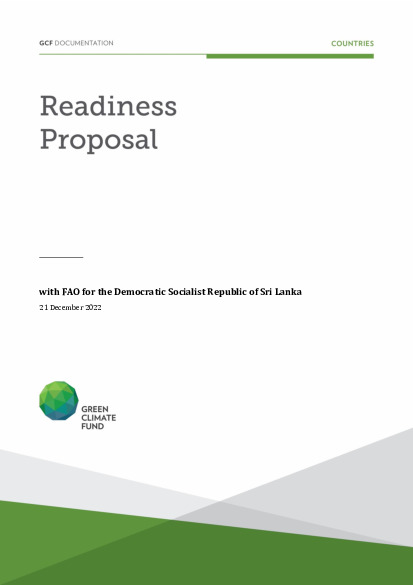Capacity enhancement of the National Designated Authority and other relevant stakeholders in Sri Lanka to re-evaluate technical needs for climate change adaptation and mitigation and assess climate finance priorities for agriculture by developing innovative climate smart investment mechanisms through increased partnerships between public and private sectors

Capacity enhancement of the National Designated Authority and other relevant stakeholders in Sri Lanka to re-evaluate technical needs for climate change adaptation and mitigation and assess climate finance priorities for agriculture by developing innovative climate smart investment mechanisms through increased partnerships between public and private sectors
Sri Lanka is highly vulnerable to climate change and has consistently been placed among the top ten countries at risk of extreme weather events by the Global Climate Risk Index. The consequences of climate change are critically affecting almost all economic sectors of the country, while frequent occurrences of natural disasters due to extreme weather events deprive lives and livelihoods of communities. There are a number of national policies, frameworks, strategies and plans in place in Sri Lanka to address the impacts of climate change such as the National Climate Change Policy of 2012, National Climate Change Adaptation Strategy (2011-2016), National Adaptation Plan for Climate Change Impacts in Sri Lanka (2016 – 2025) and the Nationally Determined Contribution (NDC) to the Paris Agreement updated in 2021.
Despite the progressive efforts made to address the negative impacts of climate change, the country has identified significant climate finance readiness gaps in almost all the important sectors affected by climate change. The major readiness gaps that need to be addressed in Sri Lanka can be categorized in the following areas:
- Climate information: There is lack of proper system and formats to consolidate the scattered information on climate issues and to disseminate them to the relevant stakeholders.
- Technological: There is a capacity gap of the NDA to assess technical needs in line with the advancements made in the climate change mitigation and adaptation technologies, along with the updated NDCs and GCF requirements.
- Intersectoral/cross-sectoral coordination: The capacity and enabling environment to develop climate smart, ecosystem-based investment plans for agriculture in Sri Lanka seems to be limited.
- Engagement of the private sector: Private sector participation and investments in implementing innovative solutions for climate risk reduction and resilience development, especially in the agriculture sector is currently very minimal.
- Capacity for resource mobilization: Relevant stakeholders have inadequate technical capacity to develop concept notes and proposals for resource mobilization.
- Knowledge management and dissemination: There is lack of systematic knowledge management and technology dissemination practices for sharing of lessons learned and best practices on a wider scale.
Through this readiness proposal, Sri Lanka intends to address the above-mentioned gaps, while building on the previous GCF Readiness and Preparatory Support projects. FAO, the delivery partner for this proposal, is also a GCF Accredited Entity (AE) and thus brings together a wealth of relevant knowledge and expertise in designing and implementing GCF funded activities in agriculture. The goal of this readiness proposal is to enhance the capacity of the NDA and its relevant stakeholders, including the private sector, to jointly identify and implement technical needs for addressing Sri Lanka’s climate challenges in its priority sectors, and leverage public and private investment for climate-smart agriculture through scientific knowledge-based planning.
The main logic of this readiness proposal is based on the premise that: IF the project is able to identify its sectoral technology needs and actions in its priority sectors for addressing climate change among sectoral stakeholders, including the private sector, and develop a climate-smart agriculture investment plan, informed by climate information, based on which to prepare bankable GCF projects, , THEN Sri Lanka will have increased its capacity to address sectoral priority needs and leverage the necessary finance, particularly in agriculture BECAUSE the NDA and its sectoral stakeholders, including the private sector, will have improved their coordination and capacity to develop and implement strategic actions guided by the most relevant sectoral plans, and investment strategies, backed by relevant climate information.
This readiness proposal will directly benefit the Ministry of Environment (MOE), Sri Lanka's National Designated Authority (NDA), along with key line ministries, particularly the Ministry of Agriculture and its agencies and private sector actors through various capacity development activities, improved sector expertise, identifying strategies and actions for improved stakeholder coordination, including private sector engagement, and enhanced GCF project development capacities. This proposal also gives due consideration to gender and women's empowerment during project planning and implementation.